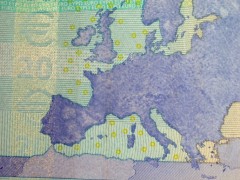by Russ Koesterich, Portfolio Manager, iShares
 With the future of Greece and the eurozone still so uncertain, many investors are asking how they might predict what the most likely outcome is.
With the future of Greece and the eurozone still so uncertain, many investors are asking how they might predict what the most likely outcome is.
While I don’t have a crystal ball, in addition to paying attention to eight pivotal eurozone events happening from now until July, I’m also watching for four critical developments in the run-up to the second Greece election on June 17. Here’s my watch list:
1.) Greek poll numbers. A market friendly development would be the New Democracy Party, Greek’s center right party, rising in the polls. This would signal that Greece is likely to accept the terms of the bailout package and remain in the euro. But if we continue to see advances by Syriza, the far left party that wants to repudiate the bailout package, the risk of a Greece showdown with the rest of Europe goes up.
2.) Greek banking system outflow. Further outflows will likely force the European Central Bank to provide more emergency assistance to prevent a collapse of the Greek banks and would signal a worsening crisis.
3.) Recapitalization of Spanish banks. Spain needs to recapitalize its banking system, which is likely to cost at least 50 billion euros. The sooner we receive some clarity on how Spain plans to do this, the better for markets and the eurozone.
4.) Germany’s position on mutualizing European debt (i.e. Eurobonds). Chancellor Merkel has long been in strict opposition to Eurobonds, but she is coming under increasing pressure to accept the idea. In fact, recent comments from her suggest that she may be softening her position. Any development in this direction would signal a growing eurozone consensus toward how to resolve the crisis, a positive for markets.
To be sure, how these developments will actually play out is hard to predict, but what is certain is that there’s little likelihood of an imminent solution in Europe and markets are likely to remain volatile as a result. As such, I continue to advocate that investors assume a modestly more defensive posture in equity portfolios. In addition to the other defensive options I’ve mentioned recently, here are two other positions to consider:
1.) Underweight India. Given India’s slowing growth, stubbornly high inflation, large current account deficit and chronically high budget deficit, I’d remain cautious on the market and use it to balance overweights to China and Taiwan — a position that has worked well since I started advocating it last February.
2.) Overweight Global Telecom. I continue to believe that this sector’s low beta (a measure of the tendency of securities to move with the market at large) and relatively high yield (around 5.5%) should provide some cushion during market volatility and sell-offs. In fact, while the iShares S&P Global Telecommunications Sector Index Fund (NYSEARCA: IXP) is down since its May high, it’s down less than the broader global stock market.
Source: Bloomberg
The author is long IXP
Past performance does not guarantee future results.
In addition to the normal risks associated with investing, international investments may involve risk of capital loss from unfavorable fluctuation in currency values, from differences in generally accepted accounting principles or from economic or political instability in other nations. Emerging markets involve heightened risks related to the same factors as well as increased volatility and lower trading volume. Securities focusing on a single country and narrowly focused investments may be subject to higher volatility.











